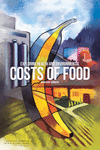The U.S. food system provides many benefits, not the least of which is a safe, nutritious and consistent food supply. However, the same system also creates significant environmental, public health, and other costs that generally are not recognized and not accounted for in the retail price of food. These include greenhouse gas (GHG) emissions, soil erosion, air pollution, and their environmental consequences, the transfer of antibiotic resistance from food animals to human, and other human health outcomes, including foodborne illnesses and chronic disease. Some external costs which are also known as externalities are accounted for in ways that do not involve increasing the price of food. But many are not. They are borne involuntarily by society at large. A better understanding of external costs would help decision makers at all stages of the life cycle to expand the benefits of the U.S. food system even further.
